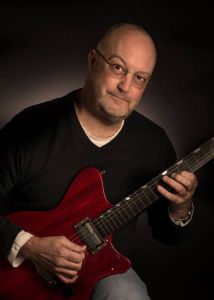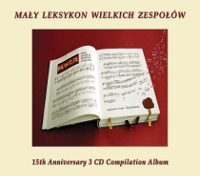American guitarist Jon Durant brings a unique sense of texture and melody to his instrument. His distinctive “cloud guitar” soundscapes and engaging lead work have graced numerous CD recordings and film soundtracks. As executive producer of Alchemy Records, he produces recordings for internationally acclaimed artists in his small home studio.
Alongside Durant's eight solo albums and three Burnt Belief records (with Colin Edwin of Porcupine Tree), Durant has also been featured on the Astarta/Edwin album which was released in 2016. In 2018 Durant, Colin Edwin and Ukrainian singer Inna Kovtun are returning with a new CD.
We chatted with Jon about his creative inspirations, the vices of streaming culture, his long-time collaboration with Porcupine Tree’s Colin Edwin and much more.
Dmitry Oliferowicz: Tell us a little about yourself.
Jon Durant: I went to Berklee College of Music after high school, but very quickly realized that given my nature as a musician dedicated to unique and original music that it wasn’t for me. From an early age I’ve been fascinated by music that doesn’t fit into popular music forms, and by the time I was at Berklee I realized that I get no pleasure from playing music because other people like it. As a result, I ended up getting a degree in marketing and put it to use in the world of music technology, first within the world of home audio (NAD Electronics) and then in the world of music/studio gear (Lexicon). While at Lexicon, among many many jobs I was responsible for artists relations. In that capacity I met a number of my favorite artists, and a few of them convinced me that I should start a label. This was how Alchemy Records was born, and out of the gate we had some great musicians on board--Michael Manring, Gary Willis, Wayne Krantz/Leni Stern. David Torn was very actively involved as a producer. In the company of such musicians, I was quite surprised that my own recordings had the reception they did, but it was quite gratifying.
Unfortunately, after a few years the industry began its severe decline with distributors going out of business, large stores going out of business. Eventually I gave up on the idea of distribution for physical products, and settled into only releasing my own records.
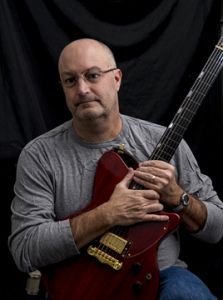 DO: You pioneered a concept called ‘cloud guitar’. Can you break it down for our readers?
DO: You pioneered a concept called ‘cloud guitar’. Can you break it down for our readers?
JD: Cloud guitar is a technique where the guitar notes hang in the air like clouds. It involves a combination of delays and reverbs, and using a volume pedal to swell the notes so that they have no obvious beginning or ending. The result is a sound that most people think are synthesizers, but they’re just processed guitar.
In recent years, I’ve begun a process (which began with Colin Edwin doing this to my cloud guitar pieces) of taking the cloud guitar textures which are not rhythmic and running them through a slicer. A slicer takes an audio file and chops up the sound into rhythmic “slices” and creates a really interesting space. Imagine a photo that’s been cut into multiple segments, and then imagine how that would happen with audio. The opening piece on “Parting Is”, “Clouds in Advance” is a great example of this technique. https://jondurant.bandcamp.com/track/clouds-in-advance
DO: What inspires you to create the kind of music that you write. Are you in favor of blending genres or sticking to one particular one and excelling in it?
JD: I am not a fan of genres, never have been. All the music that I have enjoyed over the years defies the very concept of genre, and instead is a blend of elements from all different genres. And indeed different cultures! As for inspiration, it comes from many different sources, some musical, some landscape, some food and some personal.
On “Parting Is” (https://jondurant.bandcamp.com/album/parting-is) it was much more personal than on any other record I’ve made. For that album, I had been spending a lot of time going back and forth between homes in Boston, MA and Portland, OR and always felt as though I was leaving and never staying. There was a constant sense of sadness of parting and missing something or someone wherever I was.
Also during the last couple years, I had been having discussions with a fantastic young musician from Turkey (Elif Yalvac, whose fantastic new album „L’appel du Vide” has just been released. https://hazalelif.bandcamp.com/album/lappel-du-vide ) who had asked about what I do for practicing when I don’t have a specific project going on. By way of trying to explain, I shot some quick iPhone videos to show her, and she insisted that I had to record some of these pieces. Initially I had thought that they were really just moments, not meant to be compositions but as I started to record the pieces, they really seemed to hang together well.
The recording process was interesting in that for the last several years, I’ve been using our Portland home as a “writers retreat” where I could be alone with just my guitars/gear and really focus on the music. Much of the Burnt Belief material emerged from there. Almost all of the basic tracks on “Parting Is” were done in Portland, but then I returned to Boston to record my lead guitar parts.
Another interesting element on “Parting Is” is the prominent use of fretless guitar. I’d had the great Portland luthier Saul Koll build the guitar for me a few years ago, and I first used it on Burnt Belief “Emergent”. On “Parting Is”, it very much became the focal point. The possibilities for phrasing are incredible, and I can get deeply into middle eastern or Indian phrasing in ways that are very difficult with a fretted instrument. On a fretted guitar, the notes are fixed so you don’t have the ability to glide between the notes, and get into the in between (microtonal) notes. Which is why many guitarists make use of a slide, to get that effect. Of course the difficulty with fretless is intonating the note correctly, and chords become very challenging. Another downside to fretless guitar is that there isn’t as much sustain in the notes, so to counter that I had the guitar fitted with a sustainiac pickup, which basically radiates a magnetic signal that keeps the string vibrating which results in infinite sustain.
One of my favorite pieces on the record is “The Room Where She Waits” which is a loop of electric 12 string, with fretless guitar over the top. It was a simple idea that I thought I would explore further and deepen the arrangement, but the fragility of the performance was such that I decided to leave it as is. https://jondurant.bandcamp.com/track/the-room-where-she-waits
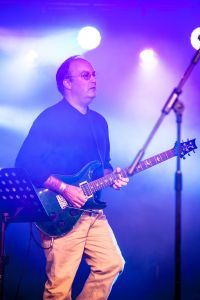 DO: Many say that the music industry has transformed beyond recognition with the advent of online music services such as iTunes and the actual demise of the physical album. Do you see it necessarily as a bad thing? Does it set new challenges for recording artists?
DO: Many say that the music industry has transformed beyond recognition with the advent of online music services such as iTunes and the actual demise of the physical album. Do you see it necessarily as a bad thing? Does it set new challenges for recording artists?
JD: I do see it as a bad thing. I still love the idea of the album as a fully contemplated project, with music designed to hold together as a complete entity, and artwork with useful liner notes. As streaming becomes the dominant format, the idea of making a living from being a recording artists is completely destroyed.
DO: As an American guitarist, do you see differences between North American and European audiences? Do people tend to stick to particular genres/bands over others in the US and Canada?
JD: It’s a very strange thing for me--I live in America, and always have, but almost all the music that matters to me comes from Europe. The biggest difference that I see is that the USA is so much larger, geographically, that the fans of a given band are much more spread out. There is a much bigger emphasis on mass marketing here, too, which makes it much harder for someone as outside of the mainstream as I am to get attention.
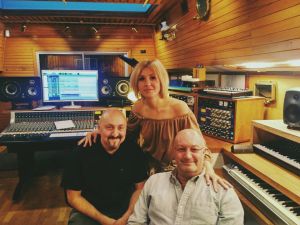 DO: Can you talk about your long-time collaboration with Porcupine Tree’s bassist Colin Edwin and Ukrainian folk singer Inna Kovtun? You’ve recently had a recording session with them in London.
DO: Can you talk about your long-time collaboration with Porcupine Tree’s bassist Colin Edwin and Ukrainian folk singer Inna Kovtun? You’ve recently had a recording session with them in London.
JD: Sure! Colin and I met when Porcupine Tree were touring in the US in 2007. We’d stayed in touch and when I’d written some music that became my album “Dance of the Shadow Planets” (https://jondurant.bandcamp.com/album/dance-of-the-shadow-planets) I realized that the bass lines were much more suited to Colin than to Tony Levin (who had played on my previous albums). He really enjoyed the recording, and we began a collaboration which became Burnt Belief which has yielded three albums which I’m very proud of. (https://burntbelief.bandcamp.com/ )
Shortly after the first Burnt Belief album, Colin had been asked to collaborate with a group doing traditional Ukrainian folk that wanted to bring their music into a modern context. Inna was one of the singers. Early on in the process, he sent me a track asking what I thought. When I started adding some guitar to the pieces, it became obvious that it was going to be a great fit. Eventually we did some live work in Kiev and London (in 2013), but then the political situation in Ukraine blew up and Colin and I thought that it would be unlikely that anything more would come of it.
About a year and a half ago, out of nowhere, Colin got some new vocal pieces from Inna. We began writing the pieces, usually starting with a basic vocal melody, and either Colin or I would begin the tracks around that, then the other would flush it out more. Eventually that would go back to Inna, who then re-wrote her melodies based on what we had done. Finally, Colin and I would then finalize our parts based on what we now had vocally from Inna. Then, we had the amazing Italian drummer Roberto Gualdi play on several of the pieces. A long, complex process to do remotely! But we have just met up in London to mix the album, and I think it is sounding fantastic.
DO: Would you consider other collaborations in the future stepping into yet unexplored sonic territory?
JD: Absolutely! In fact, I have recently begun sending ideas back and forth with the fantastic Estonian guitarist Robert Jurjendal. There’s no timeframe set, but we’re very excited about the idea of collaborating. Also, while we were mixing the new record, the ambient group Darkroom asked Inna to perform with them which went spectacularly well. There’s talk of doing more of that, maybe with me involved too.
DO: Any plans of touring solo or as part of a project in 2019? If yes, will the tour span Europe as well?
JD: We’re working on some live dates with Edwin Durant Kovtun, hopefully in the spring of 2019. They will definitely be in Europe as the cost of getting a US work visa is prohibitively high.
DO: Rounding up, we’d love to get Jon Durant’s pick of the best albums of 2018 thus far (any genre).
JD: My favorite is Nik Bartsch’s Ronin’s “Awase”. Bill Frisell’s “Music Is” is also quite good.
DO: As a well-seasoned guitarist that has his own unique sound and approach, can you give advice to those inspiring young guitar players who wish to trod their own path on how to create and maintain their own identity?
JD: The most important thing in finding your voice is to always try to be mindful of when you’re doing something that someone else has done. If you find yourself playing too much like someone you like, it might be good to step back and see what you can change to bring more of yourself into the picture.


